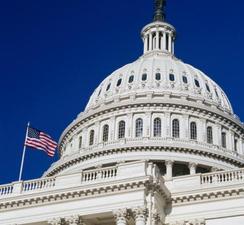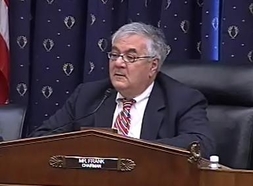






Poker Players Alliance -- Poker Bill May Likely Come as an AttachmentPPA’s Executive Director Outlines a Possible Scenario for Passage |
|
|

It seems like the back-up plan might be the new focus.
In an interview last week with Card Player, the Poker Players Alliance Executive Director John Pappas said that passing the bill as an attachment “makes a lot more sense,” and outlined a possible timeframe as to when that could happen, eyeing the November-to-January timeframe, after the elections and before the new Congress starts.
“There will be some opportunity to move legislation between the election and the new year,” said Pappas. “In an ideal world, we get something done before the election. But the next opportunity after that is the lame-duck session
The PPA executive also shares his thoughts and fears on what the new amendments to Frank’s bill will do, as well as what the advocacy group’s efforts will be in both the Ways & Means committee and in the Senate.
Check out the full interview below.
Stephen A. Murphy: What does the mark-up and passage of Barney Frank’s poker bill mean for poker players?
John Pappas: I think it’s a huge momentum boost for the issue. I think that what it demonstrates is that the old way of thinking in Congress has changed. If you look back at 2006, when the House actually voted on an Internet [gaming] prohibition bill, not the UIGEA but a similar bill, it passed by a 5-1 margin.
When you look at 2008, when the PPA tried to pass a bill out of the House Financial Services committee that would have clarified the UIGEA, it stalemated at 32-32.
Now, two years later, we’ve passed the bill in that committee on a 2-1 margin. I think it’s shown a steady progression in our favor.

JP: As the chairman indicated, he thinks that the finance bill needs to move now, the tax and revenue piece of this in the House Ways & Means committee. So, we’re going to focus our attention there. There’s not a lot of time left. They’re on recess [now], and they won’t be back until September.
We’re going to try to push for what we can in September, and then we also have some opportunities to move some things in the Senate. And then we also have the lame-duck session.
SAM: Now that Barney Frank’s bill has passed through committee, will the PPA ratchet up the intensity on Senator Robert Menendez’s (D-NJ) bill to try to garner more support?
JP: Well, they’re obviously two different bills. The nature of the Senate is much more deliberative than the House, so we have to weigh what the right strategy is there. Senator Menendez is a key player there, but there are also a lot of other key players in the Senate who we need to coordinate with before we really ratchet up the heat.
I don’t if that, if they’re asked to, it’s likely that the Senate will pass the Barney Frank bill. But a more nuanced approach in the Senate might be doable.
SAM: You mentioned that Barney Frank’s bill might be too broad for the Senate’s liking. Assuming that the PPA was able to get support in the Senate, whether it was the Menendez bill or something similar, what would then need to happen — a reconciliation bill?
JP: Yeah, that or a revenue bill — some kind of revenue measure that you could attach it to. There is always the possibility of a free-standing bill, but given that this is an election year and given the other priorities that Congress may be addressing, I think something as an attachment makes a lot more sense.
SAM: How optimistic are you that the Ways & Means committee will address this in September?
JP: I can’t even handicap it, because we haven’t even begun our outreach yet. The committee over there is also kind of in turmoil, as you know, with their [former] chairman (Rep. Charlie Rangel, D-NY) now under investigation. I think the promise of revenue makes it desirable.
They’ve already had a hearing over there once last month on this issue in Ways & Means. This isn’t going to be a case of first impressions for them. But I think there’s a lot of work to do on that committee before we get to a vote. We need to sit down with all of our team, and we need to start talking to members of the Ways & Means committee and we need to see what they think.

JP: I think the loss-limit thing has been mischaracterized. It simply mandates what many of the sites already do, which is provide you an opportunity to set loss-limits for yourself.
SAM: And you think that’s all it will be in the legislation?
JP: I don’t know. Hopefully, it’s doesn’t devolve into something where the government or the regulators are telling you how much you can or cannot lose or how much you can and cannot wager. What it intends to do is empower the individual to make those decisions himself, and be able to set those limits for himself.
SAM: The other major amendment that has sparked concern and discussion is the amendment by Rep. Brad Sherman (D-CA), which stated that any operator who broke federal law would not be able to get a license. How do you think this will affect current poker sites that accept American players?
JP: Well, there are two standards in the bill. There is the Sherman standard, and then there’s the Bachus/Bachmann [referring to Spencer Bachus (R-AL) and Michele Bachmann (R-MN)] standard, and they were both accepted. That’s obviously something that’s going to have to be worked out down the road as to which is the standard.
The Bachus/Bachmann standard says that anybody post-2006 who has taken illegal play would be prohibited from getting a license or selling their assets. I think the key words there are “taking illegal play.” The online poker sites, as I understand it, believe that they are not taking illegal play and they have legal opinions that say that they aren’t. So, I don’t think they would fall under that category.
I think the idea of tying it to the UIGEA is foolhardy. It’s just an arbitrary date. It doesn’t mean anything, because as everybody knows, the UIGEA didn’t change any laws as it relates to federal or state gaming laws. It simply was an enforcement mechanism.
So, if you were operating illegally before UIGEA, then you were operating illegally after UIGEA. If you were operating legally before the UIGEA, then you were operating legally after UIGEA.

JP: The Bachus standard kind of [insinuates] that post-UIGEA, people were operating illegally. It also says that you can’t sell your assets if you’ve been operating illegally either.
The Sherman standard does not put the arbitrary date of the UIGEA in there, and it is silent on the assets.
SAM: Do you think it will come a point where this is a list of explicit sites that are declared to be operating illegally and thus prohibited from benefiting from this legislation.
JP: No. Well, the Campbell amendment requires that there is a list kept of sites that don’t receive a license after enactment of this law. But it’s not Congress’ job to interpret legality. They create the laws and it’s up to the courts to interpret legality. One of these sites would have to be declared illegal by a competent court for it to even be considered to be excluded.
SAM: When this legislative session ends, if progress isn’t made on this, everything would have to start from the beginning, correct?
JP: Correct. There is going to be a lame-duck session this year. Everyone is 100 percent clear on that. There will be some opportunity to move legislation between the election and the new year. So, there is an opportunity there.
Even though the elections are in November, Congress will not have finished its business for the year by then. So lawmakers who have either been reelected or voted out are going to come back, and they’re going to have bills to pass before the new Congress comes in.
SAM: So, in an ideal world, you’re looking at that November-to-January timeslot as poker’s best chance to get this passed into law?
JP: No, in an ideal world, we get something done before the election. But the next opportunity after that is the lame-duck session. And Barney Frank and Senator Menendez and others are committed to reintroduce this legislation in the 112th Congress if we have to.
